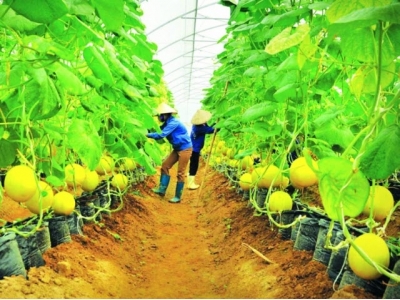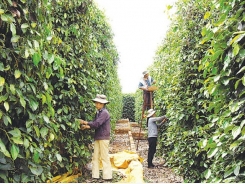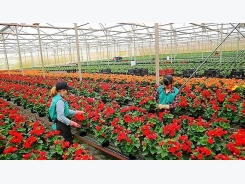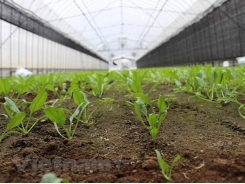Keys to participation in global agricultural value chain

Minister of Agriculture and Rural Development, Nguyen Xuan Cuong, said at a recent conference that if Vietnam is to participate in the global agricultural value chain, its agricultural sector needs to restructure production towards complete value chain-oriented cooperation and connectivity, link raw material production with processing and sales, address food safety issues, and develop markets.
Vietnam must focus on food safety and connectivity in farm produce sales
Food safety
The Ministry of Agriculture and Rural Development, in coordination with the International Support Group (ISG), sponsored the ISG Plenary Meeting themed “Integrating global agricultural value chain: Promotion of food safety and market linkages” on December 11, 2017 in Hanoi. Minister of Agriculture and Rural Development, Nguyen Xuan Cuong, said at the meeting that over the past 30 years, the Vietnamese agricultural sector had recorded remarkable achievements, making it one of the world’s 15 biggest farm produce, forest product and seafood exporters. Vietnam’s farm produce, forest product and seafood exports hit US$32 billion in 2016 and are expected to reach US$35-36 billion this year, with 10 export items expected to yield more than US$1 billion each.
However, Cuong said while Vietnam has become a major farm produce exporter, 90 percent of the country’s farm produce exports are unprocessed or semi-finished products that are in general inferior to products of the same kind from many other countries in terms of quality and value. Many Vietnamese products are sold abroad under foreign brands, the minister said. This has seriously affected Vietnam’s participation in the global agricultural value chain.
Food safety is a hot issue for Vietnam’s agricultural production, according to a World Bank representative. A World Bank study on food safety risk management in Vietnam shows that exported foodstuffs are relatively well controlled, but management of domestically sold products remains poor, with unsafe food sales and consumption becoming a burden, leading to disease problems, he said.
The Netherlands’ Ambassador to Vietnam, Nienke Troostre, said food safety is a topic of global importance. In recent years, it has become a major concern in Vietnam, as it is not only relates to domestic sales but also to exports, she said. The governments of the Netherlands and Vietnam and the World Bank are working to increase cooperation in assessing and addressing food safety risks. The three parties signed a memorandum of understanding (MoU) on food safety, through which to strengthen cooperation in improving national and local-level food safety inspection systems.
Sustainable development
According to Dr. Nguyen Do Anh Tuan, Director of the Institute of Policy and Strategy for Agriculture and Rural Development (IPSARD), to further increase export value, Vietnam needs help from international partners. In terms of technical assistance, international partners can provide Vietnam with assistance related to seeds, post-harvest technology, environmental protection, connection of industry with agriculture and service sectors, climate change adaptation, infrastructure development, and sustainable agricultural conversion programs. Regarding trade and investment, international partners can assist Vietnam in market connection, negotiation information, dispute resolution, and facilitate Vietnamese companies’ connection with international corporations to promote farm produce sales.
Dutch Ambassador Troostre said the Netherlands is willing to assist Vietnam to develop a better food safety control system. The Netherlands will provide Vietnam with the latest technology and information in the fields of food safety, land use, cooperation, value chain development and sustainable aquaculture, she said.
The World Bank research team recommended that the Vietnamese government avoid market interference with too much regulation, and focus on attracting more private businesses to production chains.
Chief Representative of the Food and Agriculture Organization (FAO) in Vietnam, JongHa Bae, said the FAO will support Vietnam in achieving its socioeconomic development plan that will reduce the rate of growth stunted people to less than 23 percent by 2020. The organization will also help the Vietnamese government implement its green growth strategy and address the issues of climate change mitigation, natural resources management, and environmental protection. It also pledged to help implement the national target program for new rural area development that will almost double rural residents’ incomes compared to 2015.
At the 2017 ISG Plenary Meeting, Minister of Agriculture and Rural Development, Nguyen Xuan Cuong, said Vietnam’s agricultural sector is trying to implement four key tasks:
1. To restructure production towards complete value chain-oriented cooperation and connectivity, link raw material production with processing and sales in compliance with value chain development;
2. To develop both domestic and foreign markets, and distribution channels; ensure food hygiene and safety; gradually develop strong brands; negotiate to open and expand export markets; keep traditional markets stable; and look for and expand potential markets;
3. To encourage the private sector to build investment and business plans compliant with the agricultural sector’s restructuring strategy and the government’s strategic development targets; and
4. To further improve institutions and policies, administrative reform and public services; mobilize resources from different sources; promote investment in the form of public-private partnerships in agricultural and rural infrastructure development in order to meet large scale commodity production demands.
Dutch Ambassador to Vietnam, Nienke Troostre, said the remarkable agricultural growth that Vietnam has experienced is largely attributed to the intensive use of land, fertilizers and agrochemicals. This farming approach is not sustainable and does not provide quality products with improved added value, she said.
Related news
Tools

Phối trộn thức ăn chăn nuôi

Pha dung dịch thủy canh

Định mức cho tôm ăn

Phối trộn phân bón NPK

Xác định tỷ lệ tôm sống

Chuyển đổi đơn vị phân bón

Xác định công suất sục khí

Chuyển đổi đơn vị tôm

Tính diện tích nhà kính

Tính thể tích ao




 JICA seeks agricultural partnerships with Vietnam
JICA seeks agricultural partnerships with Vietnam  Workshop seeks to develop smart agriculture in Vietnam
Workshop seeks to develop smart agriculture in Vietnam